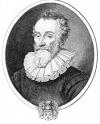Biography
Francois de Malherbe a French poet, critic, and translator.
Biography
Born in Le-Locheur (near Caen, Normandie), his family was of some position, though it seems not to have been able to establish to the satisfaction of heralds the claims which it made to nobility older than the 16th century.
He was the eldest son of another Francois de Malherbe, conseiller du roi in the magistracy of Caen. He himself was elaborately educated at Caen, at Paris, at Heidelberg and at Basel. At the age of twenty-one, preferring arms to the gown, he entered the household of Henri d'Angoulême, the third son of Henry II and future King Henry III. He served this prince as secretary in Provence, and married there in 1581. It seems that he wrote verses at this period, but, to judge from a quotation of Tallemant des Réaux, they must have been very bad ones. His patron died when Malherbe was on a visit in his native province, and for a time he had no particular employment, though by some servile verses he obtained a considerable gift of money from Henry III, whom he afterwards libelled. He lived partly in Provence and partly in Normandy for many years after this event; but very little is known of his life during this period. His Larmes de Saint Pierre, imitated from Luigi Tansillo, appeared in 1587.
Malherbe exercised, or at least indicated the exercise of, a great and enduring effect upon French literature, though not exactly a wholly beneficial one. From the time of Malherbe dates the gradual development of the poetic rules of "Classicism" that would dominate until the Romantics. The critical and restraining tendency of Malherbe who preached greater technical perfection, and especially greater simplicity and purity in vocabulary and versification, was a sober correction to the luxuriant importation and innovation of Pierre de Ronsard and La Pléiade, but the lines of praise by Nicolas Boileau-Despréaux beginning Enfin Malherbe vint ("Finally Malherbe arrived") are rendered only partially applicable by Boileau's ignorance of older French poetry.
The personal character of Malherbe was far from amiable, and the good as well as bad side of Malherbe's theory and practice is excellently described by his contemporary and rival Mathurin Régnier, who was animated against Malherbe, not merely by reason of his own devotion to Ronsard but because of Malherbe's discourtesy towards Régnier's uncle Philippe Desportes, whom the Norman poet had at first distinctly plagiarized.
Malherbe's reforms helped to elaborate the kind of verse necessary for the classical tragedy, but his own poetical work is scanty in amount, and for the most part frigid and lacking inspiration. The beautiful Consolation a Duperier, in which occurs the famous line - Et, rose, elle a vécu ce que vivent les roses - the odes to Marie de' Medici and to Louis XIII, are the best-remembered of his works.
His prose work is much more abundant, not less remarkable for care as to style and expression, and of greater positive value. It consists of some translations of Livy and Seneca, and of a very large number of interesting and admirably written letters, many of which are addressed to Peiresc, the man of science of whom Gassendi has left a delightful Latin life. It also contains a most curious commentary on Desportes, in which Malherbe's minute and carping style of verbal criticism is displayed on the great scale.
Malherbe's two most important disciples were François Maynard and Racan; Claude Favre de Vaugelas is credited with having purified French diction at about the same time. ..






